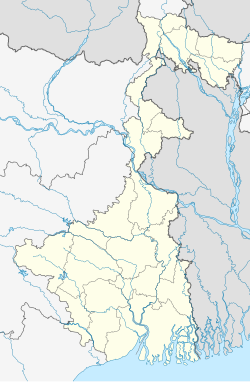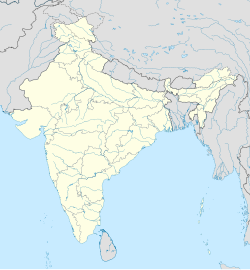Laulara is a village in the Puncha CD block in the Manbazar subdivision of the Purulia district in the state of West Bengal, India.
Laulara | |
|---|---|
Village | |
| Coordinates: 23°10′25″N 86°39′46″E / 23.1735°N 86.6628°E | |
| Country | |
| State | West Bengal |
| District | Purulia |
| Population (2011) | |
• Total | 2,743 |
| Languages | |
| • Official | Bengali, English |
| Time zone | UTC+5:30 (IST) |
| PIN | 723151 |
| Telephone/STD code | 03253 |
| Lok Sabha constituency | Purulia |
| Vidhan Sabha constituency | Manbazar |
| Website | purulia |
Geography
edit5miles
Reservoir
CT: census town, R: rural/ urban centre, H: historical/ religious centre
Owing to space constraints in the small map, the actual locations in a larger map may vary slightly
Location
editLaulara is located at 23°10′25″N 86°39′46″E / 23.1735°N 86.6628°E.
Area overview
editPurulia district forms the lowest step of the Chota Nagpur Plateau. The general scenario is undulating land with scattered hills. Manbazar subdivision, shown in the map alongside, is located in the eastern part of the district. It is an overwhelmingly rural subdivision with 96.32% of the population living in the rural areas and 3.68% living in the urban areas. There are 3 census towns in the subdivision. The map shows the Kangsabati Project Reservoir. The Mukutmanipur Dam is in Bankura district but the upper portion of the reservoir is in Manbazar subdivision. The remnants of old temples and deities are found in the subdivision also, as in other parts of the district. The subdivision has a very high proportion of Scheduled Castes and Scheduled Tribes. Bandwan CD block has 51.86% ST population, Manbazar II CD block has 48.97% ST population. Manbazar I CD block has 22.03% ST and 22.44% SC. Puncha CD block has 24.74% ST and 14.54 SC.[1][2][3][4] Writing in 1911, H. Coupland, ICS, speaks of the aboriginal races largely predominating in the old Manbhum district. He particularly mentions the Kurmis, Santhals, Bhumij and Bauri.[5]
Note: The map alongside presents some of the notable locations in the subdivision. All places marked in the map are linked in the larger full screen map.
Demographics
editAccording to the 2011 Census of India, Laulara had a total population of 2,743, of which 1,378 (50%) were males and 1,365 (50%) were females. There were 342 persons in the age range of 0–6 years. The total number of literate persons in Laulara was 1,542 (64.22% of the population over 6 years).[6]
Transport
editLaulara is on the Hura-Puncha Road.[7]
Education
editRamananda Centenary College, established in 1971, is affiliated with the Sidho Kanho Birsha University. It offers honours courses in Bengali, English, economics, education, history, geography, philosophy, political science, physics, chemistry, and general courses in arts and science. The college is named after Ramananda Chatterjee, a renowned journalist.[8][9]
Laulara R.C. Academy is a Bengali-medium, coeducational institution established in 1940. It has facilities for teaching from class V to class XII.[10] It has also Primary education department.
References
edit- ^ Houlton, Sir John, Bihar, the Heart of India, 1949, p. 170, Orient Longmans Ltd.
- ^ "District Statistical Handbook 2014 Purulia". Tables 2.1, 2.2. Department of Planning and Statistics, Government of West Bengal. Retrieved 12 January 2020.
- ^ "CD block Wise Primary Census Abstract Data(PCA)". 2011 census: West Bengal – District-wise CD blocks. Registrar General and Census Commissioner, India. Retrieved 16 January 2020.
- ^ "Travel and Tourism : Purulia". The Official Website of Purulia District.
- ^ "Bengal District Gazetteers – Manbhum by H. Coupland". Page 76: Manbhum, Castes and Tribes. University of California, San Diego. Retrieved 10 February 2020.
- ^ "C.D. Block Wise Primary Census Abstract Data(PCA)". West Bengal – District-wise CD Blocks. Registrar General and Census Commissioner, India. Retrieved 19 January 2020.
- ^ Google maps
- ^ "Ramananda Centenary College". RCC. Retrieved 19 January 2020.
- ^ "Ramananda Centenary College". Careers 360. Retrieved 19 January 2020.
- ^ "Loulara RC Academy". ICBSE. Retrieved 19 January 2020.

